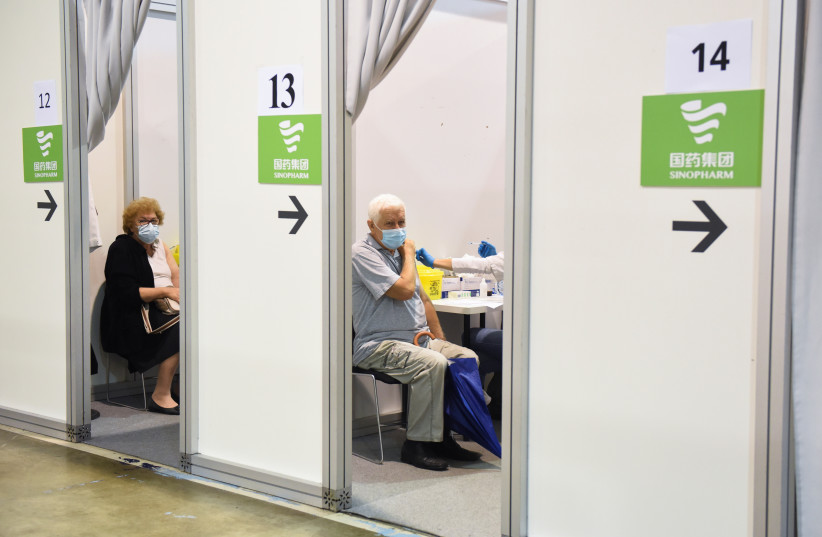The results of an official Bahraini study of four types of COVID-19 vaccines revealed that the Pfizer, Sputnik V and AstraZeneca vaccines were several times better at confronting the virus than China’s Sinopharm vaccine.
According to the study, which included the data of more than one million people, the Chinese-developed Sinopharm vaccine was less suitable for those over 50 years old, but in general, it reduced the death rate to a quarter compared to those who did not receive any vaccine dose.
The Bahraini team tasked with dealing with the COVID-19 virus – the National Taskforce to Combat the Coronavirus – authored the study, published online last month in preprint form ahead of peer review.

The study relied on the results of those vaccinated in Bahrain between Dec. 9, 2020, and July 17, 2021, or some 1,003,960 people, as part of the Gulf kingdom’s vaccination campaign. Bahrain used four types of vaccine for its campaign, which did not include Moderna or Sinovac, which has inoculated some 91% of the eligible population.
The study also used data from 245,876 people who were not vaccinated, including travelers, and those who were in contact with people infected with the coronavirus.
According to the study, as of July 2021, some 56.6% of vaccinated people received the Sinopharm vaccine, later receiving booster shots of the Pfizer vaccine; while 18.4% were vaccinated with the Russian Sputnik vaccine, 16.8% with the Pfizer vaccine, and 7.3% with the AstraZeneca vaccine.
The study showed that some 82.2% of the 10,447 people hospitalized with cases of the coronavirus in Bahrain were unvaccinated, while the remaining hospitalized patients included 16.1% who received the Sinofarm vaccine, 0.7% who received the Sputnik vaccine, 0.43% who received the AstraZeneca vaccine, and 0.38% who received the Pfizer vaccine.
Of the 1,451 people who required treatment in the intensive care unit, 90.2% of them, or 1,309, were unvaccinated; compared to 138 people who received the Sinopharm vaccine; three who received the AstraZeneca vaccine; and one who received the Pfizer vaccine. No one who received the Sputnik vaccine was admitted to the ICU.
Of the 976 people who died of the virus, 857 people, or 87.8%, were not vaccinated; while there were 112 deaths of those vaccinated with Sinopharm, or 11.5%; three deaths each among those who received Sputnik or Pfizer; and one death of someone who received the AstraZeneca vaccine.
The scientific research was conducted in cooperation with Columbia University.
One of the study’s authors, Dr. Manaf AlQahtani, an infectious disease consultant and a member of the Bahraini national medical team tackling the coronavirus, told reporters: “We believed from the beginning that the vaccine helps curb the spread of the virus, but the main goal of it is to reduce complications in the event of infection and to reduce deaths or hospitalizations.”
“This study contributes to shaping future policies in adopting vaccines globally, and Bahrain has made a large imprint in the scientific community to provide this type of data,” he stressed.
He added: “There is a difference between the additional dose and the activation dose as, according to the studies that were conducted in Bahrain, an additional dose is given to people who did not generate sufficient antibodies, while the activation dose is given to ensure that the antibodies remain in the human body sufficiently. After a certain period of time, the proportion of these antibodies in the human body decreases.”
Regarding the weakness of the Sinopharm vaccine, he said: “All vaccines were certainly effective, and at rates that differ from one type to another according to the way it works. According to the study, the death rate among those who did not receive any vaccine compared to those who received the Sinopharm vaccine increases 3.8 times.”
Dr. Rajesh Mundan, an Indian emergency doctor working in Bahrain, told The Media Line about the Sinopharm vaccine that “it seems that it is not suitable enough for people over 50 years of age, because of its manufacturing method that relies on traditional methods, and therefore Bahrain needed to give an additional booster dose of another vaccination such as Pfizer.”
“It cannot be said that the Sinopharm vaccination was a failure, but it was less effective and, in general; with a booster dose it could become more appropriate,” he added. “The picture began to become clearer with the passage of time.”
Commenting on the Bahraini study, he said: “It is a very accurate study. Bahrain has a sophisticated electronic system that includes all the data accurately. Therefore, as soon as you enter the person’s number, all the data appears to you, and you can benefit from it easily, which made the data analysis of more than a million people possible and more easily available.”
